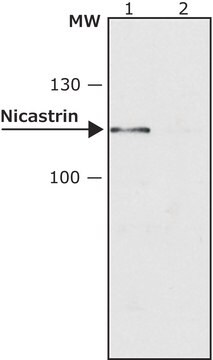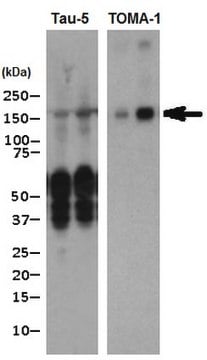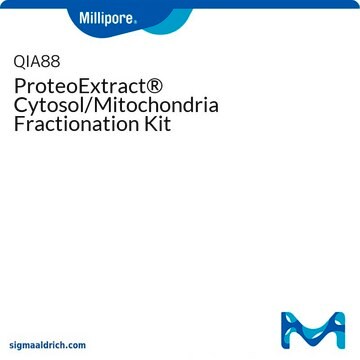おすすめの製品
由来生物
rat
品質水準
抗体製品の状態
culture supernatant
抗体製品タイプ
primary antibodies
クローン
hPS1-NT, monoclonal
化学種の反応性
human
メーカー/製品名
Chemicon®
テクニック
ELISA: suitable
immunohistochemistry: suitable
immunoprecipitation (IP): suitable
western blot: suitable
アイソタイプ
IgG2a
NCBIアクセッション番号
UniProtアクセッション番号
輸送温度
wet ice
ターゲットの翻訳後修飾
unmodified
遺伝子情報
human ... PSEN1(5663)
特異性
Recognizes Presenilin-1, human. By Western blot the antibody recognizes a predominant 32 kDa polypeptide in a variety of samples, including PC12 cells transfected with human PS1 complementary DNA, brain biopsy specimens from demented patients, and postmortem samples of frontal neucortex from Familial Alzheimer′s Disease cases, late-onset Alzheimer′s disease cases, and cases of other degenerative disorders. Immunohistochemical studies of control brains revealed that PS1 is expressed primarily in neurons, with the protein localizing in the soma and dendritic processes. In contrast in FAD and sporadic Alzheimer′s disease cases, PS1 immunoreactivity was present in the neuritic component of senile plaques as well as in neurofibrillary tangles. Localization of PS1 immunoreactivity in familial and sporadic Alzheimer′s disease suggest that genetically heterogeneous forms of the disease share a common pathophysiology involving PS1 protein.
免疫原
A fusion protein antigen containing the N-terminus of human PS-1 (residues 21-80) fused to GST.
Epitope: N-terminus
アプリケーション
Research Category
ニューロサイエンス
ニューロサイエンス
Research Sub Category
神経変性疾患
神経変性疾患
Immunohistochemistry: rat pups and 24 old month rats were perfused for 10 minutes with 100-200mL of 4% PFA 0.3% glutaraldehyde and 0.1% CaCl2 in 0.1M PBS pH 7.4. Vibratome sections were blocked with 3% normal serum and permeabilized with 0.1% triton X-100.{Neuroscience 2003 120:405-423}.
Immunoblotting: 1:250-1:500. Recommend blocking buffer is TBS containing 5% non fat milk and 0.01% Tween 20. It is recommended that you also dilute the antibody in this blocking buffer. Incubate with the MAB1563 for 1 to 2 hours at room temperature or overnight at 4°C.
Immunoprecipitation
ELISA
Optimal working dilutions must be determined by end user.
Immunoblotting: 1:250-1:500. Recommend blocking buffer is TBS containing 5% non fat milk and 0.01% Tween 20. It is recommended that you also dilute the antibody in this blocking buffer. Incubate with the MAB1563 for 1 to 2 hours at room temperature or overnight at 4°C.
Immunoprecipitation
ELISA
Optimal working dilutions must be determined by end user.
This Anti-Presenilin-1 Antibody, N-terminus, clone hPS1-NT is validated for use in ELISA, IH, IP, WB for the detection of Presenilin-1.
ターゲットの説明
32 kDa
物理的形状
Unpurified
UnPurified mouse tissue culture supernatant from a perfusion system, filtered through a 0.2μ micron membrane prior to vialing. Product contains 20%FBS and Ciprofloxacin at final concentration of 10μg/mL.
保管および安定性
Maintain for 1 year at -20°C from date of shipment. Aliquot to avoid repeated freezing and thawing. For maximum recovery of product, centrifuge the original vial after thawing and prior to removing the cap.
アナリシスノート
Control
Brain tissue
Brain tissue
その他情報
Concentration: Please refer to the Certificate of Analysis for the lot-specific concentration.
法的情報
CHEMICON is a registered trademark of Merck KGaA, Darmstadt, Germany
免責事項
Unless otherwise stated in our catalog or other company documentation accompanying the product(s), our products are intended for research use only and are not to be used for any other purpose, which includes but is not limited to, unauthorized commercial uses, in vitro diagnostic uses, ex vivo or in vivo therapeutic uses or any type of consumption or application to humans or animals.
適切な製品が見つかりませんか。
製品選択ツール.をお試しください
保管分類コード
10 - Combustible liquids
WGK
WGK 1
引火点(°F)
Not applicable
引火点(℃)
Not applicable
適用法令
試験研究用途を考慮した関連法令を主に挙げております。化学物質以外については、一部の情報のみ提供しています。 製品を安全かつ合法的に使用することは、使用者の義務です。最新情報により修正される場合があります。WEBの反映には時間を要することがあるため、適宜SDSをご参照ください。
Jan Code
MAB1563:
試験成績書(COA)
製品のロット番号・バッチ番号を入力して、試験成績書(COA) を検索できます。ロット番号・バッチ番号は、製品ラベルに「Lot」または「Batch」に続いて記載されています。
Sun Young Oh et al.
Journal of neurochemistry, 113(1), 262-274 (2010-01-22)
The amyloid precursor protein is a ubiquitously expressed transmembrane protein that has been long implicated in the pathogenesis of Alzheimer's disease but its normal biological function has remained elusive despite extensive effort. We have previously reported the identification of Notch2
Lindsay Poppe et al.
Alzheimer's research & therapy, 11(1), 102-102 (2019-12-14)
EphA4 is a receptor of the ephrin system regulating spine morphology and plasticity in the brain. These processes are pivotal in the pathophysiology of Alzheimer's disease (AD), characterized by synapse dysfunction and loss, and the progressive loss of memory and
Marty A Fernandez et al.
The Journal of biological chemistry, 289(45), 31043-31052 (2014-09-23)
The presenilin-containing γ-secretase complex produces the amyloid β-peptide (Aβ) through intramembrane proteolysis, and >100 presenilin mutations are associated with familial early-onset Alzheimer disease (AD). The question of whether these mutations result in AD through a gain or a loss of
Sophie Ayciriex et al.
The Biochemical journal, 473(3), 321-334 (2016-01-27)
γ-Secretase is a multi-subunit membrane protease complex that catalyses the final intramembrane cleavage of the β-amyloid precursor protein (APP) during the neuronal production of amyloid-β peptides (Aβ), which are implicated as the causative agents of Alzheimer's disease (AD). In the present
Sarah Veugelen et al.
Neuron, 90(2), 410-416 (2016-04-23)
Recently it was proposed that the familial Alzheimer's disease (FAD) causing presenilin (PSEN) mutations PSEN1-L435F and PSEN1-C410Y do not support the generation of Aβ-peptides from the amyloid precursor protein (APP). This challenges the amyloid hypothesis and disagrees with previous work
ライフサイエンス、有機合成、材料科学、クロマトグラフィー、分析など、あらゆる分野の研究に経験のあるメンバーがおります。.
製品に関するお問い合わせはこちら(テクニカルサービス)








